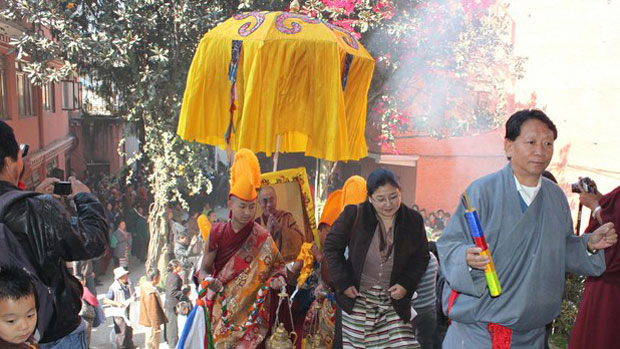Tibetet Segítő Társaság Sambhala Tibet Központ
Tibet Support Association Sambhala Tibet Center
székhely / telephely H-Budapest I. Attila út 123..
(00-36) 70 431 9343 (00-36)70 944 0260 (06-1)782 7721
sambhala@tibet.hu www.tibet.hu tibetpress.info
Facebook/Sambhala Tibet Központ Facebook/Tibett Segítő Társaság
MagnetBank/ 16200010-00110240
IBAN/HU94 16200010 00110240 00000000 SWIFT/HBWEHUHB
(1%) adószám/ 18061347-1-41
nyitva tartás/hétköznap 12.00-20.00 hétvégén előadás függő
» Retro» Tibeti művészet» Interjú» Levelek» Tibet Press» Tibet Press English» Dharma Press» Human Rights» Világ» Kína» Magyar» Ujgur» Belső-Mongólia » KőrösiCsoma» Élettér» Határozatok» Nyilatkozatok» tibeti művészet» lapszemle.hu» thetibetpost.com» eastinfo.hu» rangzen.net» ChoegyalTenzin» tibet.net» phayul.com» DalaiLama.com» vilaghelyzete.blogspot.com» Videók» Linkek» TibetiHírek» Szerkesztőség
Nepál vizsgálatot rendelt el azon újságírók iránt akik a Dalai Lámáról írtak
2019. május 14./Tibet Sun/TibetPress
Jelenleg csak angolul olvasható. Magyarul később.
eredeti cikk
Government authorities in Nepal have opened an investigation into three state-employed journalists who published a wire report about the recent stay in an Indian hospital of exiled Tibetan spiritual leader the Dalai Lama.
The move was undertaken at the request of China’s embassy in Kathmandu, Somnath Lamichhanne—a reporter for Rashtriya Samachar Samiti (RSS) and one of the three journalists now under scrutiny—told RFA’s Tibetan Service this week.
“Under pressure from the Chinese government, Nepal’s Minister of Communication and Information Technology Gokul Baskota has ordered an investigation into this matter, and three of our journalists are being questioned,” he said.
The report, a short news item saying that the Dalai Lama had been discharged from a hospital in Delhi after a short stay, was a story of “humanitarian interest” concerning a prominent world figure, Lamichhanne said.
“Unfortunately, we are now being criticized for acting against our country’s foreign policy and the One-China policy by disseminating this information,” Lamichhanne said, adding that he and his two colleagues, identified in media reports as Mohani Risal and Jivan Bhandari, have offered an explanation for their actions.
“However, the issue has not been resolved yet,” he said.
Also speaking to RFA, Dilliram Batarai—one of four members of a committee assigned by RSS chairman Harikar Adhikari (Shyamal) to conduct the inquiry—said the investigation is still under way, and that "no statements have yet been released.”
“RSS is a state-run news agency, however, and our investigation will be guided by Nepal’s relationship with China, by the One-China policy, and by Nepal’s foreign policy. So we report to higher authorities,” he said.
Nepal shares a long border with Tibet and is home to around 20,000 exiles who began arriving in 1959 when a failed Tibetan uprising against Chinese rule forced Tibet’s spiritual leader the Dalai Lama into exile in Dharamsala in India’s Himalayan foothills.
Nepal cites the One-China Policy and its strong ties with Beijing in cracking down on Tibetan community activities in the country, such as elections among the refugee community and birthday celebrations for the Dalai Lama.
Growing crackdown
Speaking to RFA, South Asia Director for Human Rights Watch Meenakshi Ganguly said that Nepal has recently experienced a growing crackdown on freedom of expression, along with proposals “that will further restrict speech.”
“At the same time, in an effort to appease China, Nepali authorities have already placed numerous restrictions on the rights of Tibetan refugees to organize peaceful protests or express themselves,” Ganguly said.
“It is shocking that the Nepal government should object even to reporting on the Dalai Lama’s health, and it exposes how the authorities can force the media to self-censor by caving in to Chinese demands,” he said.
“It doesn’t take an insider to understand that China is a major backstage player in all things Dalai Lama-related," agreed a Himalayan historian and expert on the region, pointing to what he called a growing trend of censorship in Nepal.
“But the publishing of other issues, areas of Nepali domestic life that have no direct relation with Chinese influence, are also being affected,” he said.
Also speaking to RFA, Cedric Alviani—head of the East Asia office of the press freedoms watchdog group Reporters Without Borders (RSF)—said that the three Nepali reporters under investigation had only been “doing their job by reporting news of interest for their readers.”
“RSF calls for an immediate hold on this investigation, [whose] obvious purpose is to intimidate reporters and create future self-censorship,” he said.
Reported by Lhuboom and Tashi Wangchuk. Translated by Tenzin Dickyi. Written in English by Richard Finney.
